Related Research Articles

Thunderbolt is a 1910 Australian feature film based on the life of the bushranger Captain Thunderbolt. It was the directorial debut of John Gavin who later claimed it was the first "four-reel movie" made in Australia. It has also been called the first film made in New South Wales.
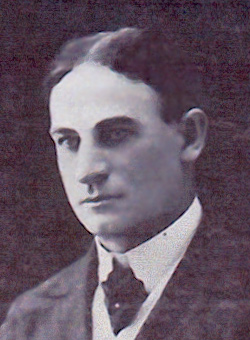
Albert Edward Bailey, better known as Bert Bailey, was a New Zealand-born Australian playwright, theatrical manager and stage and screen actor best known for playing Dad Rudd, in both mediums, the character from the books penned by Steele Rudd.
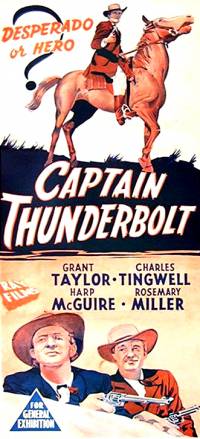
Captain Thunderbolt is a 1953 Australian action film from director Cecil Holmes about the bushranger Captain Thunderbolt. It was one of the few all-Australian films of the 1950s.

Moonlite is a 1910 Australian bushranger film about Captain Moonlite, played by John Gavin, who also directed for producer H.A. Forsyth. It was also known as Captain Moonlite and is considered a lost film.
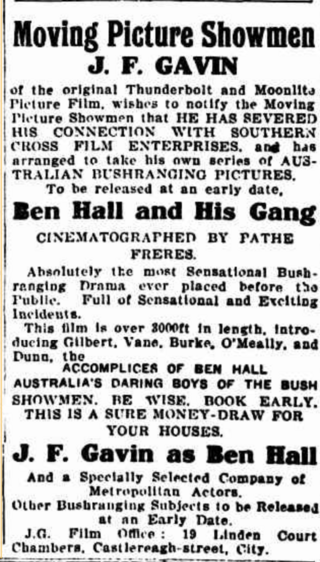
Ben Hall and his Gang is a 1911 Australian film about the bushranger Ben Hall, played by John Gavin, who also directed. It is considered a lost film.

Frank Gardiner, the King of the Road is a 1911 Australian film about the bushranger Frank Gardiner, played by John Gavin, who also directed. It was the fourth consecutive bushranger biopic Gavin made, following movies about Captain Thunderbolt, Captain Moonlite and Ben Hall.

Assigned to his Wife is a 1911 Australian silent film from director John Gavin. It is a convict-era "military romantic melodrama".

Our Friends, the Hayseeds is a 1917 Australian rural comedy from director Beaumont Smith. It centers on the rural family, the Hayseeds, and their rivalry with a neighbouring family, the Duggans.

Edmund Duggan was an Irish-born actor and playwright who worked in Australia. He is best known for writing a number of plays with Bert Bailey including The Squatter's Daughter (1907) and On Our Selection (1912). His solo career was less successful than Bailey's. His sister Eugenie was known as "The Queen of Melodrama" and married noted theatre producer William Anderson, for whom Duggan frequently worked as an actor, writer and stage manager.
The Squatter's Daughter is a 1910 Australian silent film based on the popular play by Bert Bailey and Edmund Duggan.
The Christian is a 1911 Australian silent film starring Roy Redgrave and Eugenie Duggan. It was the first film directed by Franklyn Barrett. The film was based on Hall Caine's play adapted from his novel The Christian which was published in 1897 and the first British novel to sell one million copies.
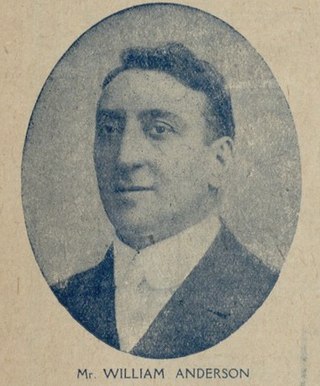
William Anderson was an Australian theatre entrepreneur.
The Native Born is an Australian play written by Bert Bailey and Edmund Duggan under the name of Albert Edmunds. It was first produced in 1913 by Bailey's own company.
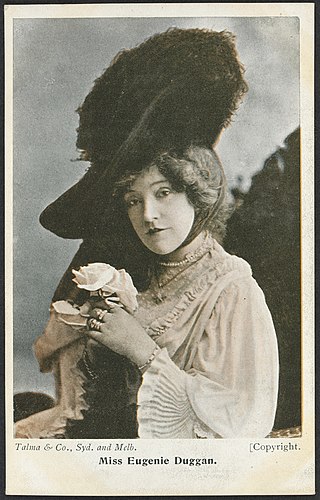
Eugenie Marian Duggan was a popular Australian stage actress. She was the sister of the actors Edmund, P.J. and Kathleen Duggan. She began studying acting, won a number of elocution competitions and made her professional debut in 1890 in Romeo and Juliet.

Edward Irham Cole was an Australian theatrical entrepreneur and film director whose productions represented a synthesis of Wild West show and stage melodrama. He managed a theatre company, called the Bohemian Dramatic Company, that performed in semi-permanent and temporary tent theatres. During 1910 and 1911 Cole directed a number of silent films, adapted from his stage plays and using actors from his theatre company.
The Border Police of New South Wales was a frontier policing body introduced by the colonial government of New South Wales with the passing of the Crown Lands Unauthorised Occupation Act 1839.
Three Years with Thunderbolt is a 1905 memoir by William Monckton concerning his time with the Australian bushranger Captain Thunderbolt. The book was edited by Ambrose Pratt.
The Democrat, or Under the Southern Cross is a 1891 Australian stage play by Edmund Duggan about the Eureka Rebellion. It is the first known stage play on this conflict. It was revived in 1897 under the title Eureka Stockade.
The Winning Ticket is a 1910 Australian play about the Melbourne Cup by William Anderson and Temple Harrison. It was also produced by Anderson.
Outlaw Kelly is a 1899 Australian play about Ned Kelly by Lancelot Booth.
References
- ↑ "Advertising". The Sydney Morning Herald . No. 21, 088. New South Wales, Australia. 7 October 1905. p. 2. Retrieved 7 April 2024– via National Library of Australia.
- ↑ "THEATRE ROYAL". The Sydney Morning Herald . No. 21, 094. New South Wales, Australia. 14 October 1905. p. 16. Retrieved 7 April 2024– via National Library of Australia.
- ↑ "The Theatrical Gazette". The Referee . Sydney: National Library of Australia. 11 October 1905. p. 10. Retrieved 30 November 2014.
- ↑ Synopsis of the play is at "Amusements". The Register . Adelaide: National Library of Australia. 31 January 1916. p. 7. Retrieved 30 March 2015.
- ↑ "Sydney Shows". Punch. Victoria, Australia. 12 October 1905. p. 31. Retrieved 7 April 2024– via National Library of Australia.
- ↑ "SUNDRY SHOWS.", The Bulletin, Sydney, N.S.W: John Haynes and J.F. Archibald, 19 October 1905, nla.obj-669849007, retrieved 7 April 2024– via Trove
- ↑ "AMUSEMENTS". Evening News . No. 11, 966. New South Wales, Australia. 16 October 1905. p. 8. Retrieved 7 April 2024– via National Library of Australia.
- ↑ "THEATRE ROYAL—"THUNDERBOLT."". The Sydney Morning Herald . No. 21, 095. New South Wales, Australia. 16 October 1905. p. 3. Retrieved 7 April 2024– via National Library of Australia.
- ↑ "AMUSEMENTS". The Age . No. 16062. Victoria, Australia. 3 September 1906. p. 8. Retrieved 7 April 2024– via National Library of Australia.
- ↑ "Advertising". The Argus . Melbourne: National Library of Australia. 21 May 1910. p. 20. Retrieved 30 March 2015.
- ↑ "Advertising". The Sydney Morning Herald . National Library of Australia. 20 October 1905. p. 2. Retrieved 30 March 2015.
- ↑ "THE THEATRICAL GAZETTE". Referee. No. 988. New South Wales, Australia. 11 October 1905. p. 10. Retrieved 7 April 2024– via National Library of Australia.